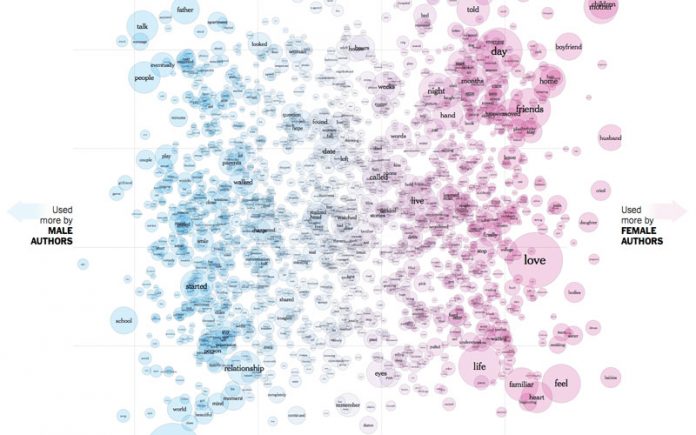Supporters of gay marriage have aggressively promoted the idea that “all kids need is love.” They argue that children do not specifically need the love of their father or the love of their mother, just generic “love.” For that to be the case, there must be no substantial differences between the sexes. But whenever we look at men and women outside of those politically charged conversations, the essential and beautiful gender differences materialize. Here’s just one example:
The New York Times evaluated the essays they’ve published over the last four years. They examined the word choice of men and women who wrote about love and this is what they discovered: “Women write more about feelings, men about actions.”
One paper, one subject, two genders… massive difference.
If men and women naturally talk about love differently, then it stands to reason that they also express love differently as well. That’s especially true when it comes to parental love. It’s been repeatedly demonstrated that gender matters in parenting. So different are the methods and expressions of love from mothers and fathers that some experts suggest that we do away with the generic term “parenting” altogether and simply use the terms “mothering” and “fathering.”
In their essays about love, the NYT notes,
Men’s words tended to be more active: “bomb,” “hit,” “strike,” “punch,” “battle.” Women were more likely to describe feelings: “resentment,” “furious,” “agony,” “hurt;” they were also significantly more likely to use the word “feel.” Men, meanwhile, didn’t write about different emotions than women – they just mentioned fewer of them.
The parallels between the way that men and women write about love and the way they interact with children, specifically during playtime, is striking. Glenn Stanton explains these differences and their critical importance in the realm of child developemt:
Fathers tend to play with, and mothers tend to care for, children….Fathers encourage competition; mothers encourage equity. One style encourages independence while the other encourages security….Both provide security and confidence in their own ways by communicating love and physical intimacy.
The NYT piece revealed that when writing about their own family, or reflecting on their spouse’s family, gender also played a prominent role. It seems that the impact of one’s same-sex parent and relationship with that parent loomed large over the author’s idea of love:
When men wrote about family, they used words like “father,” “dad” and “son,” while women used “mother,” “mom” and “daughter.” (And we checked — in these essays, the writers were almost always referring to their own or their partner’s family members, not themselves.)
Gender greatly impacts parent-child relationships in myriad ways. Even the article from the New York Times recognizes that men and women respond, not just differently to their children, but differently to their male and female children.
“Parents report feeling a closer relationship to a child of the same sex even before babies are born, some studies have shown. They tend to spend more time with children of the same sex and are more likely to say they want a child of their sex. And children often look to parents of the same sex as role models for relationships.”
Having one parent of each sex is important so children can daily enjoy and learn from both halves of humanity. They also crave both maternal and paternal love exactly because they recognize gender differences. Here is one child, who was clearly loved by her mother and her mother’s female partner, sharing how she needed the love of her father:
There is really something special about the father-daughter bond I think. His opinion mattered so much. And that he liked me and came to my speech meets and volleyball games- that was everything. When I disappointed him, that’s when I knew that I needed to shape up. My mom was always great too but she didn’t talk the same way to me as my dad and I really wanted his attention and wanted to please him. I had friends who didn’t have a dad at all and I know that they envied how my dad would take me out on father-daughter dates when I visited him on the weekend.
I think that lesbians and gay men can be good parents. I know they can because my mom was a great mom. But when people say that two moms can replace a dad or two dads can replace a mom I am like “You don’t even know.” You don’t know how I needed my dad. And my mom and Tracy are both great!! But they cannot be my dad.
You cannot have it both ways. If you accept that sex differences impact how men and women write about love (which it clearly does) you’d be a hypocrite to believe that sex differences are irrelevant to the children who receive that love.
Either gender matters everywhere, or it doesn’t matter anywhere.






















